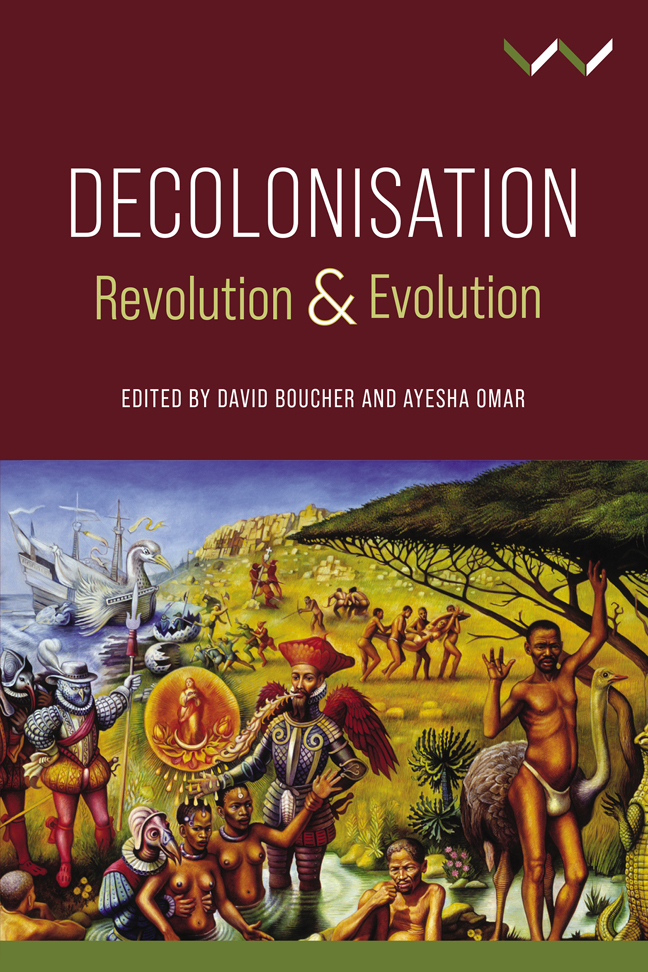Book contents
- Frontmatter
- Contents
- Acronyms
- Introduction: Decolonisation: Interdisciplinary Perspectives
- Chapter 1 The Invention of Blacks: Notes on Conquest, Fear and Time
- Chapter 2 The Decolonisation of Southern Africa: Historical Reflections
- Chapter 3 The Border of Trust at Kat River for Coloured Settlers, 1851–1853
- Chapter 4 Decolonisation and the Enduring Legacy of Colonial Borders in Africa
- Chapter 5 Fanon's Challenge: Identity, Recognition and Ideology
- Chapter 6 Beyond Redemption: Unsettling Progressive-Romantic Storyings of Colonial Injustice in Western Critical Thought
- Chapter 7 The Limits of Decolonisation and the Problem of Legitimacy
- Chapter 8 Decolonisation – Real and Imagined
- Chapter 9 Decolonisation and the Crisis of African Literature in the Twenty-First Century
- Chapter 10 Pedagogical Disobedience in an Era of Unfinished Decolonisation
- Contributors
- Index
Chapter 7 - The Limits of Decolonisation and the Problem of Legitimacy
Published online by Cambridge University Press: 01 March 2024
- Frontmatter
- Contents
- Acronyms
- Introduction: Decolonisation: Interdisciplinary Perspectives
- Chapter 1 The Invention of Blacks: Notes on Conquest, Fear and Time
- Chapter 2 The Decolonisation of Southern Africa: Historical Reflections
- Chapter 3 The Border of Trust at Kat River for Coloured Settlers, 1851–1853
- Chapter 4 Decolonisation and the Enduring Legacy of Colonial Borders in Africa
- Chapter 5 Fanon's Challenge: Identity, Recognition and Ideology
- Chapter 6 Beyond Redemption: Unsettling Progressive-Romantic Storyings of Colonial Injustice in Western Critical Thought
- Chapter 7 The Limits of Decolonisation and the Problem of Legitimacy
- Chapter 8 Decolonisation – Real and Imagined
- Chapter 9 Decolonisation and the Crisis of African Literature in the Twenty-First Century
- Chapter 10 Pedagogical Disobedience in an Era of Unfinished Decolonisation
- Contributors
- Index
Summary
Indigenous peoples have long challenged the claims of European states and their settler colonial successors to exercise sovereignty over their territories. Ever since the 1960 United Nations (UN) ‘Declaration on the Granting of Independence to Colonial Countries and Peoples’, General Assembly Resolution 1514 (XV) (United Nations 1960) limited the right of self-determination to subjugated territories that were ‘geographically separate’ – a requirement often misleadingly referred to as the ‘blue water’ or ‘salt water’ thesis, suggesting the need for there to be ocean between the colonial power and the territory in question – their path towards decolonisation has been different from that of the territories decolonised during the 1950s and 1960s. Up until the adoption in 2007 of the UN ‘Declaration on the Rights of Indigenous Peoples’, General Assembly Resolution 61/295 (UNDRIP, United Nations 2007), it has largely been pursued through the domestic courts and legislatures of the settler colonial countries. These countries developed a range of constitutional and legal settlements that determined the status of the Indigenous peoples, from domestic dependant sovereignty to treaties and the recognition of common law rights to land and other resources. A variety of arguments have been put forward in support of special status and specific rights for such colonised Indigenous peoples, in the ongoing effort to ‘decolonise’ their relationship to the liberal democratic states that have inherited these constitutional and legal settlements. One such argument raises questions about the legitimacy of government by such states (Ivison 2017; Moore 2010; Patton 2009, 2019).
There are two distinct approaches to the question of legitimacy in contemporary political philosophy. One approach builds on the tradition from John Locke to Immanuel Kant and John Rawls in supposing that government is legitimate when it produces the kinds of moral goods expected of government, such as justice. In these terms, it may be argued that citizens who benefit from the protections of a just social order tacitly consent to the government that provides those protections. Rawls argues that the exercise of (coercive) political power is legitimate when it produces justice, or at least a political regime that is not too unjust.
- Type
- Chapter
- Information
- DecolonisationRevolution and Evolution, pp. 165 - 188Publisher: Wits University PressPrint publication year: 2023



